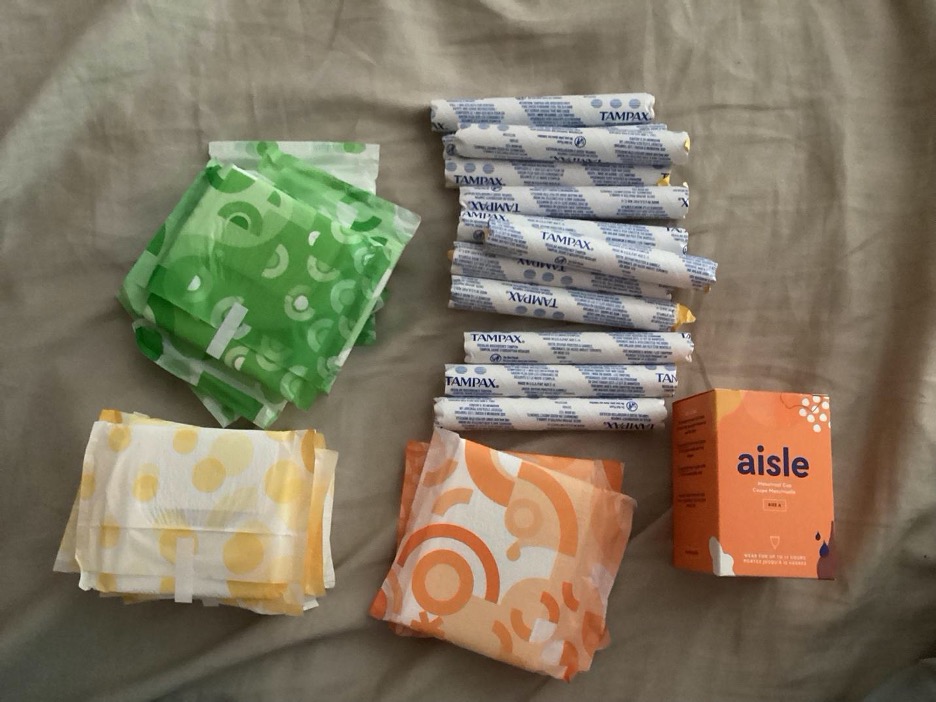
Listen to the full story here:
The Menstrual Equity Fund Pilot Project’s 2023 research survey found one in six menstruating Canadians has experienced period poverty.
Period poverty is a lack of access to menstrual products, menstrual hygiene education, and inaccessibility to “basic sanitation services or facilities,” and is often neglected as an economic hardship according to a study in the National Library of Medicine.
According to the Center for Menstrual Cycle and Ovulation Research, a period can last from three to six days, and the average usage is three to four pads or tampons a day. On Amazon, you can buy a pack of 18 Tampax tampons for $4.77 (26c each) and a pack of 48 Always pads for $7.99 (17c each) plus shipping.
Period poverty affects university students as well, leading several Canadian universities to make changes in menstrual product accessibility, including Toronto Metropolitan University (TMU) as of 2020.
“Many kids are really tapped out financially, right? Even spending an extra $5 can be an issue for a lot of people,” said Dr. Jen Gunter, a gynecologist and author of the book Blood: The Science, Medicine, and Mythology of Menstruation.
With a 2020 Western Ontario University report indicating that 33 per cent of women under 25 face financial hardships in getting menstrual products, Dr. Gunter explains several different ways universities should be helping their students.
“First of all, making sure that there are free menstrual products available in all bathrooms. Free disposable products in all bathrooms would be very important,” said Dr. Gunter.
“I think it would be great if students also got a free menstrual cup or menstrual disc in their sort of ‘welcome to university’ package.”
While TMU does not provide these types of welcome packages for students nor are there free menstrual products in campus bathrooms, they do provide some solutions for students who require menstrual products.
TMU’s Centre for Safer Sex and Sexual Violence Support (C3SVS) offers a service where students can receive menstrual and hygiene supplies monthly, with choices ranging from menstrual cup kits, pad kits, and tampon kits. They can be ordered online and have to be picked up in person at the Student Campus Centre in SCC 209.
In response to OTR’s inquiries, TMU* provided statements via email explaining students can find spaces on campus to find free menstrual products, such as the Gdoo-maawnjidimi Mompii Indigenous Student Services (KHW-389), Tri-Mentoring Program (POD-54) and International Student Support (POD-50A), in addition to the Student Campus Centre (SCC) where the C3SVS operates.
“At TMU, we recognize that financial constraints and societal stigma pose barriers to accessing menstrual products for some students,” they said via email.
“At the SCC, menstrual products are maintained and stocked by an external vendor every two weeks along with all the disposal bins,” according to TMU.
In other locations, products are “refilled by staff and distributed to students by request.”
The C3SVS kits – found at the SCC – include a minimum of 10 menstrual pads and/or 10 tampons and/or one diva cup, depending on which kit is ordered. Additionally, the kits are supposed to include chocolate, candy, and self-care items.
“At the SCC, the brand commonly used is Hospeco (the parent company of Tampax and Maxithins). That being said, both at the SCC and in other locations, the brand may vary according to availability and the vendor’s dispenser program,” TMU responded in the email.
OTR ordered each kit to examine the contents students are given and found that the kits ordered were combined and included 12 Tampax brand regular absorbency tampons, 13 Always brand pads and one Aisle menstrual cup. Also inside was one small pack of Maynards Sour Patch Kids and one gummy shaped like a hotdog.
Chocolates and self-care items were not included in the menstrual kits OTR examined.
Dr. Gunter says universities should be surveying their students to figure out period poverty and inequity and that schools should be “making sure that for people who have significant menstrual pain issues, for example, very bad cramps or they have endometriosis, have some kind of flexibility with scheduling exams.”
TMU says “students with health concerns are encouraged to speak with a medical professional” at the Medical Centre, located in Kerr Hall West which “offers a variety of health services,” including “physicals, assessments for common medical problems and medical certificates.”
For menstruating students who need to take time off school, TMU says they are “encouraged to speak with their professor to discuss alternative options. Students are also permitted to request Academic Consideration per Policy 167 when they experience extenuating circumstances that have a significant impact on their ability to fulfill an academic requirement.”
*The email from TMU includes responses in collaboration with staff members in the Office of the Vice-President, Administration and Operations and Equity and Community Inclusion, and the Office of the Vice-Provost, Students.
Reporter for On The Record, winter 2024. Fourth-year journalism student at Toronto Metropolitan University.

